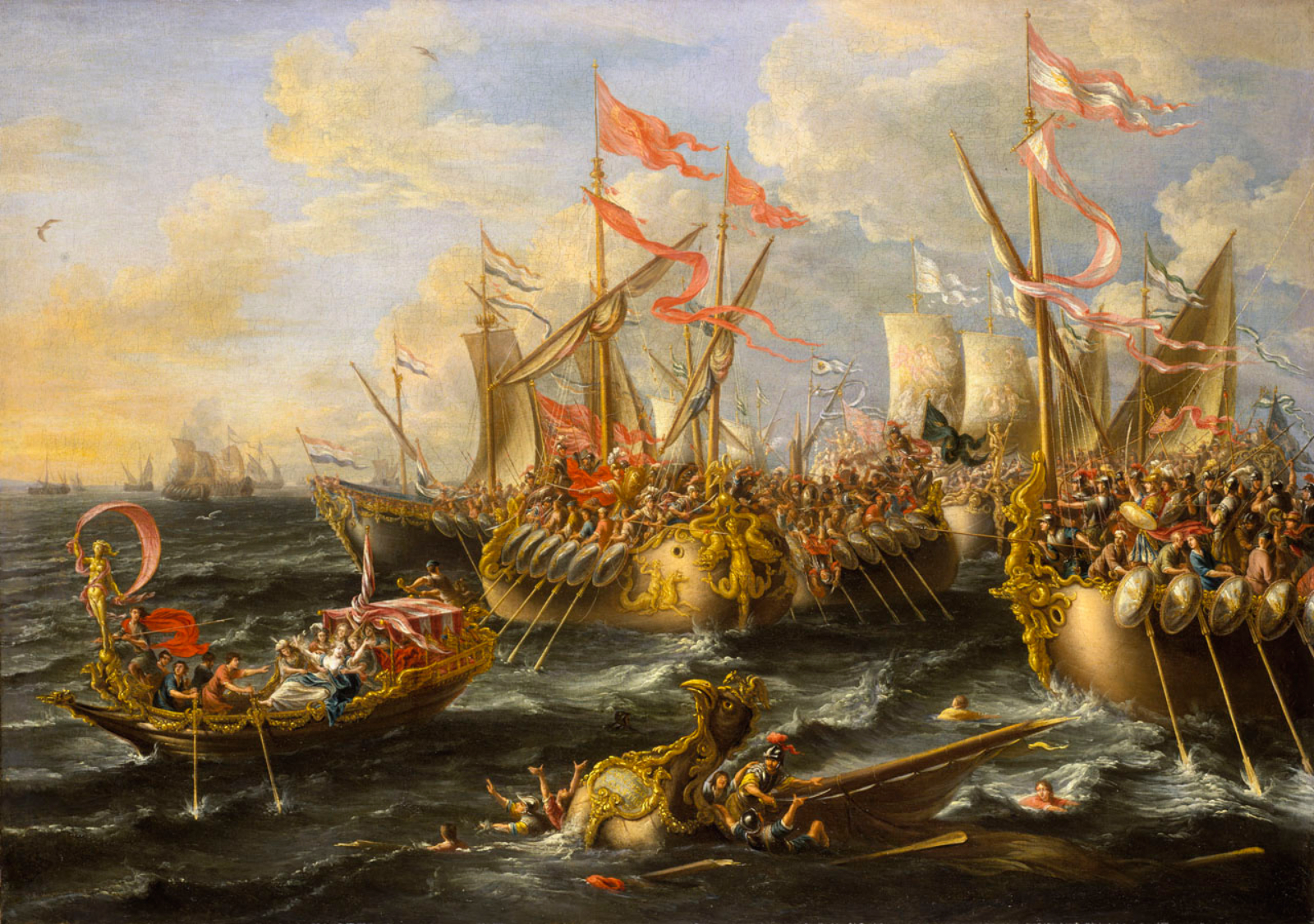It happened today - September 2, 2015
 History is full of what-ifs, and you can lose yourself in them. Everything can come to seem so highly contingent that no real patterns emerge. What if Hitler had been killed in World War I? What if Washington had died as a child? What if either man’s grandfather had been dead drunk and made a horrible impression the first time he met his future wife? And yet we study history because there are patterns.
History is full of what-ifs, and you can lose yourself in them. Everything can come to seem so highly contingent that no real patterns emerge. What if Hitler had been killed in World War I? What if Washington had died as a child? What if either man’s grandfather had been dead drunk and made a horrible impression the first time he met his future wife? And yet we study history because there are patterns.
All of which brings me, obviously, to the battle of Actium, on September 2 of the year 31 B.C. I know, I know, it all seems so long ago now. As C.S. Lewis once wrote, when he lectured on the origins of Christianity to R.A.F. members he expected them to be skeptical because the stories the Gospels told involved miracles. Instead, he said, “my impression is that they disbelieved them simply because they dealt with events that happened a long time ago: that they would be almost as incredulous of the battle of Actium as of the Resurrection – and for the same reason.”
So would I please get to the point and say what happened at Actium? Certainly. Octavian crushed the navy of Mark Antony and Cleopatra, who fled to Egypt where they later killed themselves. Octavian, once he defeated them in a final battle at Alexandria, went on to become the Emperor Augustus and the Roman Republic was buried for good. Not least because both Augustus, who denied being Emperor (Princeps or “First Citizen” was the only title he permitted), and his successor Tiberius were benevolent dictators.
Somebody somewhere, and to my great frustration, said there’s nothing more dangerous to liberty than a benign despot and I think it was Augustus he was talking about. At any rate, the collapsing political structure of the Roman Republic was replaced by an Empire very smoothly in part because Augustus ruled so long (41 years) and so well and so did the oft-maligned Tiberius (23 years). By the time you got to the Caligulas and Neros no one remembered how it used to be and, to be fair, no one had a solution to the problems of the republican system anyway. So probably a centralized and autocratic system was coming anyway, and part of Augustus’ contribution was to be an outstanding administrator as well as an excellent military leader. And the world has much to be grateful for in the long and comparatively benevolent effects of the Roman Empire. (As Louis L’Amour of all people said, and this quotation I could find, “Even during the dark days of Nero and Caligula, the Roman Empire was governed well. The terrors they brought were largely spent on their associates at court; the administration in the provinces was only slightly affected, if at all.”)
It was also the Roman Empire that facilitated the spread of Christianity despite official hostility lasting centuries. And yet one writer (Josiah Ober) in a collection of “What if” historical essays called, of all things, What If?2 suggested that
“If Antony had won at Actium, Jesus of Nazareth… would have come to manhood in a very different society – one administered by highly trained Ptolemaic bureaucrats, rather than nervous Roman amateurs like Pontius Pilate. Those Ptolemaic bureaucrats would have had a much closer sense of how Jerusalem politics worked: they might well have found some solution to local concerns about a self-proclaimed messiah that would not have required his crucifixion.”
I don’t know about that on all kinds of grounds. But one is that Antony seems to me to have been gormless and Cleopatra fey. As a couple they just weren’t going to end up winning the war; they reinforced one another’s bad habits. I rather suspect that the debacle at Actium was a perfect miniature summation of everything wrong with them as a “power couple” who were unable to seize power for the same reason they would have been unable to wield it if they had won. And to suggest that absent Tiberius and company the whole Jesus thing would have been quietly set aside is to apply too much hindsight.
Indeed, to anticipate the impact of the crucifixion on world history rather requires being a Christian; otherwise killing this guy looked like the standard and doubtless highly effective solution to the minor ruckus he and his tiny band of shabby followers were causing. And in fact from the Roman point of view there was never any reason to regret it or, indeed, to notice it much. It’s not as though the crucifixion led to a flurry of memos back and forth and recriminations; apart from two mentions by Josephus and one by Tacitus, all we know about him comes from the Gospels.
Obviously we can never decisively answer any “What if”. But I think it’s fair to say that Anthony lost at Actium because he was a loser, and Augustus won because he was a winner, who went on to reshape Roman politics in a highly effective manner that many people agreed was necessary and that worked reasonably well for a long time.
So Actium went pretty much as you’d expect it to, looking forward or backward.